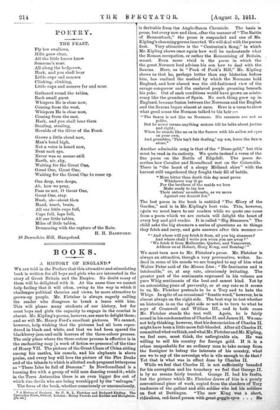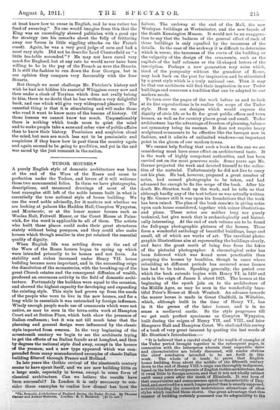BOOKS.
A HISTORY OF ENGLAND.*
WE are told in the Preface that this attractive and stimulating book is written for all boys and girls who are interested in the story of Great Britain and the Empire. No doubt many of them will be delighted with it. At the same time we cannot help feeling that it will often, owing to the way in which it challenges political theories and views, be more attractive to grown-up people. Mr. Fletcher is always eagerly calling the reader who disagrees to break a lance with him. This will please many students of our history, but for most boys and girls the capacity to engage in the combat is absent. Mr. Kipling's poems, however, are sure to delight them; and so will Mr. Henry Ford's excellent pictures. We cannot, however, help wishing that the picturei had all been repro- duced in black and white, and that we had been spared the blackberry-jam-and-milk horrors of the three-colour process. The only place where the three-colour process is effective is in the enchanting map [a work of fiction we presumel of the time of Henry VII. The picture of the Great Chain of China sitting among his castles, his camels, and his elephants Is above praise, and every boy will love the picture of the Fire Drake and of the islands to which is allotted such pregnant letterpress as "These Isles be full of Demons." In Newfoundland is a burning fire with a group of wild men dancing round it; while in the Terra Antarctica there is an even bigger fire out of which rise devils who are being worshipped by the " salvages."
The form of the book, whether consciously or unconsciously,
• A history of England. By C. R. L. Fletcher and Budyard Kipling. The Clarendon Press, Oxford. London : Henry Frowde and Hodder and Stoughton.
is derivable from the Anglo-Saxon Chronicle. The basis is prose, but every now and then, after the manner of " The Battle of Brunanburh," the prose is suspended and one of Mr. Kipling's eharniing poems inserted. We will deal with the poems first. Very attractive is the " Centurion's Song," in which Mr. Kipling shows once again how well he understands what the Roman occupation, or rather the Romanizing of Britain, meant. Even more vivid is the poem in which the the great Norman lord advises his son how to deal with the
Saxons. Here, as in " Puck of Pook's Hill," Mr. Kipling
shows us that he, perhaps better than any historian before him, has realized the method by which the Normans held England, and how absurd, was the old-fashioned view of the
savage conqueror and the enslaved people groaning beneath his yoke. Out of such conditions would have grown an aristo- cracy like the grandees of Spain. No such thing grew up in
England, becapse fusion between the Normans and the English and the Saxons began almost at once. Here is a verse to show what good sense the Norman talked to his heir
" The Saxon is not like us Normans. His manners are not so polite,
But he never means anything serious till he talks about justice and right; When he stands like an oa in the furrow with his sullen set eyes on your own,
And grumbles, This isn't fair dealing,' my son, leave the Saxon alone."
Another admirable song is that of the " Dane-geld," but this
must be read in its, entirety. We quote instead a verse of the fine poem on the. Battle of Edgehill. The poem de- scribes how Cavalier and Roundhead met on the Cotswolds.
There in "the heart of a sleepy Midland shire" with the harvest still ungatherecl they fought their flll of battle, "More bitter than death this clay must prove Whichever way it go For the brothers of the maids we love Make ready to lay low Their sisters' sweethearts, as we move Against our dearest foe."
Tho last poem in the book is entitled " The Glory of the Garden," and is in Mr. Kipling's best vein. This, however, again we must leave to our readers while we quote one verse from a poem which we are certain will delight the heart of every boy and girl reader. It is, called "Big Steamers." The child asks the big steamers a series of questions as to things they fetch and carry, and gets answers after this manner: " 'And where will you fetch it from, all you big steamers? And where shall I write you when you are away ? ' `We fetch it from Melbourne, Quebec, and Vancouver, Address us at Hobart, Hong Kong, and Bombay.'"
We must turn now to Mr. Fletcher's prose. Mr. Fletcher is always an attractive, though a very provoeative, writer. In-
deed in some of his moods we are tempted to say of him what Walter Pater said of the Manna Lisa: "He fascinates and is intolerable," or, at any rate, atrociously irritating. The greater part of the sentiments expressed in his volume are pure Whig sentiments of the best and sanest kind. Yet by an astonishing piece of perversity, or at any rate so it seems to us, Mr. Fletcher pretends to be a Tory and to hate the
Whigs. In spite of an occasional "frantic word," however, he is almost always on the right side. The best way to test whether an historian is on the right side or not is to turn to what he says of Cromwell and William III., and in both cases Mr. Fletcher stands the test well. Again, he is fairly sound in his condemnation of Charles II. and James II. We can-
not help thinking, however, that his denunciation of Charles H. might have been a little more full-blooded. After all Charles It committed what we think, and what Mr. Fletcher and Mr. Kipling, we feel sere, must think, the unforgivable sin. He was willing to sell his country for foreign gold. If it is a crime unspeakable for an ordinary man to take money from the foreigner to betray the interests of his country, what are we to say of the sovereign who is vile enough to do that P Yet that is what was in effect done by Charles II. While we feel that Charles II. is not sufficiently branded for his corruption and his treachery we feel that George II. is by no means fairly treated. George II. had his faults, but the picture which Mr. Fletcher draws of him is a purely conventional piece of work, copied from the slanders of Tory traducers of the gallant and able soldier who led his soldiers on foot at Dettingen. "The new King was a short, ridiculous, red-faced person with great goggle eyes. . . . at least knew how to swear in English, and he was rather too fond of swearing." No one would imagine from this that the King was an exceedingly shrewd politician with s. good eye for strategy (see his remarks about the folly of frittering away our forces in little niggling attacks on the French coast). Again, he was a very good judge of men and had a most racy style. Did not he describe Lord Chesterfield ae " little tea-table scoundrel " ? He may not have eared very much for England, but at any rate he would never have been willing to be in the pay of the French as were the Stuarts. It is still the fashion to run down the four Georges, but in our opinion they compare very favourably with the four Stuarts.
But though we must challenge Mr. Fletcher's history and wish he had not hidden his essential Whiggism every now and then under a cloak of Toryism which does not really belong to him, there is no doubt that he has written a very delightful book, and one which will give very widespread pleasure. The essential thing is that it is stimulating and will make those who read it want to know more of the lessone of history. Of those lessons we cannot know too much. Unquestionably there is nothing which tends more to quiet the mind and to make people take a sane and sober view of public affairs than to know their history. reesimisra and suspicion cloud the mind, but men are much less apt to be pessimistic and suspicious if they know how in past times the country again and again seemed to be going to perdition, and yet in the end was saved by the just remnant in the nation.







































 Previous page
Previous page